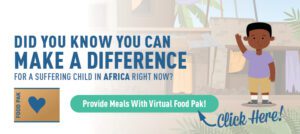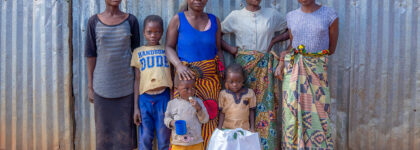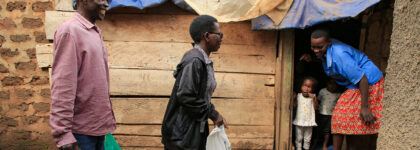In Malawi, nine-year-old Christopher struggles to keep up in school, likely due to cognitive delays caused by ongoing nutritional deficiencies throughout his childhood. In California,…
In a small plot of land in Ethiopia, a young girl in a bright pink dress walks toward a simple building. The structure is constructed of mud bricks and corrugated steel and has a simple piece of fabric acting as a door.
The girl’s name is Hani, and she lives here with her mother, Khadra, and her baby brother. The Ethiopian government constructed the building—and many others—to provide housing for the hundreds of thousands of Somali refugees escaping the political instability and violence in their home country. The buildings within the compound consist of walls and a roof, but little else.

Members from a nearby church have reached out to families in this community with gospel-centered mercy ministry. Doctor—his name, not his profession—has been visiting Khadra and her children for over a year. With two young children in her care, Khadra’s had limited options for employment and the Food Paks Doctor provided were gratefully received.
When Doctor saw how bare the home was and how little they had, he went to the church and asked if they could donate any used furniture or clothing to Khadra.
The church immediately told him, “No, we won’t do that; we’ll buy them new things.”
Now, instead of sitting on the dirt floor, they have a couch and some chairs. Khadra and her children have clothing and shoes. They have coverings for the metal walls and floor.

Within the last several months, Khadra has turned her small space into a homestead. With some initial help from the church, she has begun growing a variety of vegetables. She is also raising goats and chickens. In addition to feeding her family, these projects have also provided her with an opportunity to earn some income.
Though the church has had a powerful impact in Khadra’s home, her ability to attend church services is impacted by distance and lack of transportation. With a car, the commute from Khadra’s home to church would be about a ten-minute drive. On foot, however, it is about an hour’s walk—a long way for little legs to go.
One member of the ministry team owns a tuk tuk that he uses to deliver food in the community. When he is able, he picks them up and takes them to church. Sometimes, Doctor rents a taxi and makes the trip to their home to make sure they can make it to church as often as possible.
 The most beautiful thing about Khadra’s story, however, has been her unshakeable faith. Even in her most destitute state, she knew that God would provide for her and her children. She knows, without any doubt, that God sees her, that He hears her, and that He loves her. The care of the local church has clearly been evidence of God’s faithfulness.
The most beautiful thing about Khadra’s story, however, has been her unshakeable faith. Even in her most destitute state, she knew that God would provide for her and her children. She knows, without any doubt, that God sees her, that He hears her, and that He loves her. The care of the local church has clearly been evidence of God’s faithfulness.
Khadra understands, just as our church partners do, that the food is not the focus of the ministry. The Food Pak is a tool to build relationships and share the hope of the gospel.
Khadra’s story is a beautiful example of how the local church is uniquely positioned to step into the lives of those in need and care for their needs, both physical and spiritual.




